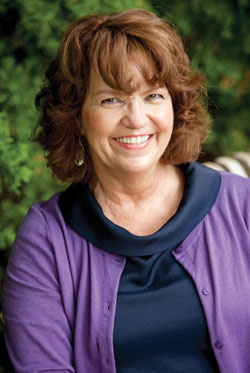Ovarian Cancer Survivor
She Listened to Her Body and It Paid Off
 Sandy Moore was paying attention to her body and knew something was wrong. After a diagnosis of Stage IIIC ovarian cancer, she successfully underwent a two-year treatment, which ended a little more than one year ago. Sandy recently celebrated milestone anniversaries at work and with her husband.
Sandy Moore was paying attention to her body and knew something was wrong. After a diagnosis of Stage IIIC ovarian cancer, she successfully underwent a two-year treatment, which ended a little more than one year ago. Sandy recently celebrated milestone anniversaries at work and with her husband.
At age 56, my body began to inexplicably change. It got to a point where I couldn’t eat more than a thimbleful of food, and I looked like I was six months pregnant. I visited my doctor on several occasions, but the examinations and laboratory tests re-vealed nothing.
Then one night in May 2010, my inner voice woke me up and said, “Something is seriously wrong inside of you.” Despite the lack of results from previous medical testing, the next morning I took myself to the emergency room. I told the doctors there that I thought I was having a heart attack. Instead, they told me I had fibroid tumors (noncancerous lumps) in my uterus and referred me to a gynecologist.
The gynecologist disagreed with that diagnosis and instead told me I had uterine cancer. After a surgery on July 16, I finally found out that what I really had was ovarian cancer—specifically Stage IIIC epithelial carcinoma.
When I heard the news, I reacted stoically. I think at some level I already knew. I underwent a standard six-week course of chemotherapy using a combination of drugs, followed by another year of treatment at a lower dose. However, that final year was cut short by one month because of a complication involving superior vena cava (SVC) syndrome.
My experience with SVC syndrome is probably one of the most significant parts of my cancer journey, both physically and emotionally. After one of my treatments, my tongue and throat became so swollen that breathing was difficult, so my oncologist sent me to the emergency room. There they treated me for an allergic reaction, which reduced the swelling, and then sent me home. From then on, the same thing would happen five days after each chemotherapy treatment. But every time, the swelling would become more severe.
My husband and I knew something was seriously wrong. My biceps, neck, breasts and face were all triple in size. In addition, my face was blue, my veins and nodes were bulging along my throat, and I had massive bruising under my breasts. My husband wanted me to quit treatment; he thought it was killing me. I couldn’t bring myself to do that, though. I was too worried that the cancer would come back.
This went on for about 10 months before I was properly diagnosed with the somewhat rare SVC syndrome. A scab – or clot – had been forming at the end of my power catheter during every chemo treatment. By the time it was caught, it had almost entirely blocked my SVC. It took three attempts using different procedures, but the doctors were finally able to place a stent in the vein, and after about a month the swelling and symptoms eventually stopped.
My other side effects were fairly mild compared to the SVC syndrome and included some nausea, fatigue, hair loss and peripheral neuropathy. For me, the worst part about the hair loss was that my head was always so cold! Peripheral neuropathy was my most constant complaint, but my husband would whip up smoothies with glutamine in them which helped tremendously.
It has been a little more than a year since my treatment stopped. I think I still have a little neuropathy, but in general I feel good as long as I don’t dwell too much on each and every ache or pain. I also exercise regularly and try to watch what I eat.
Now that I’m done with treatment, I get much more emotional when I talk about my cancer. I think everyone thinks it’s all behind me and I don’t have anything to worry about. But I do worry. I worry that my cancer might return.
Thankfully, I still receive incredible support from a group I meet with on Thursdays. Technically for breast cancer survivors, anyone is welcome, and we get together for exercise and camaraderie.
To this day, I’m thankful I paid attention to my inner voice. Listen to your body, and you, too, can get through this.


